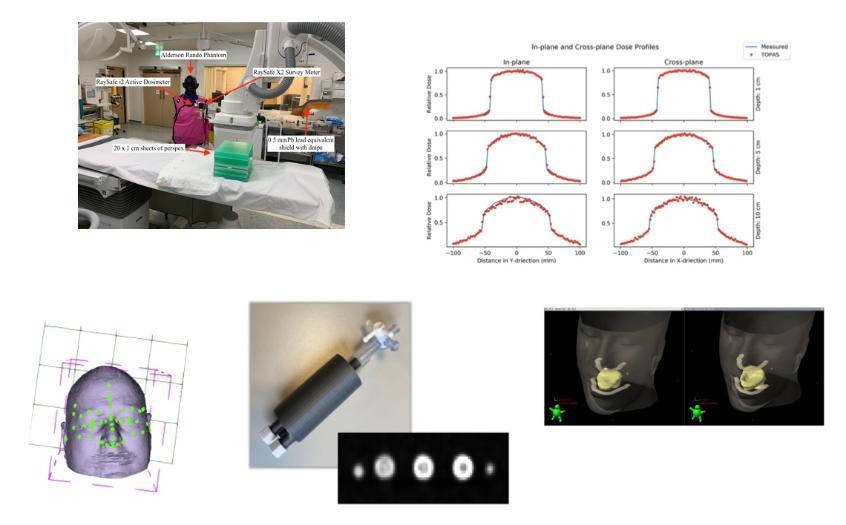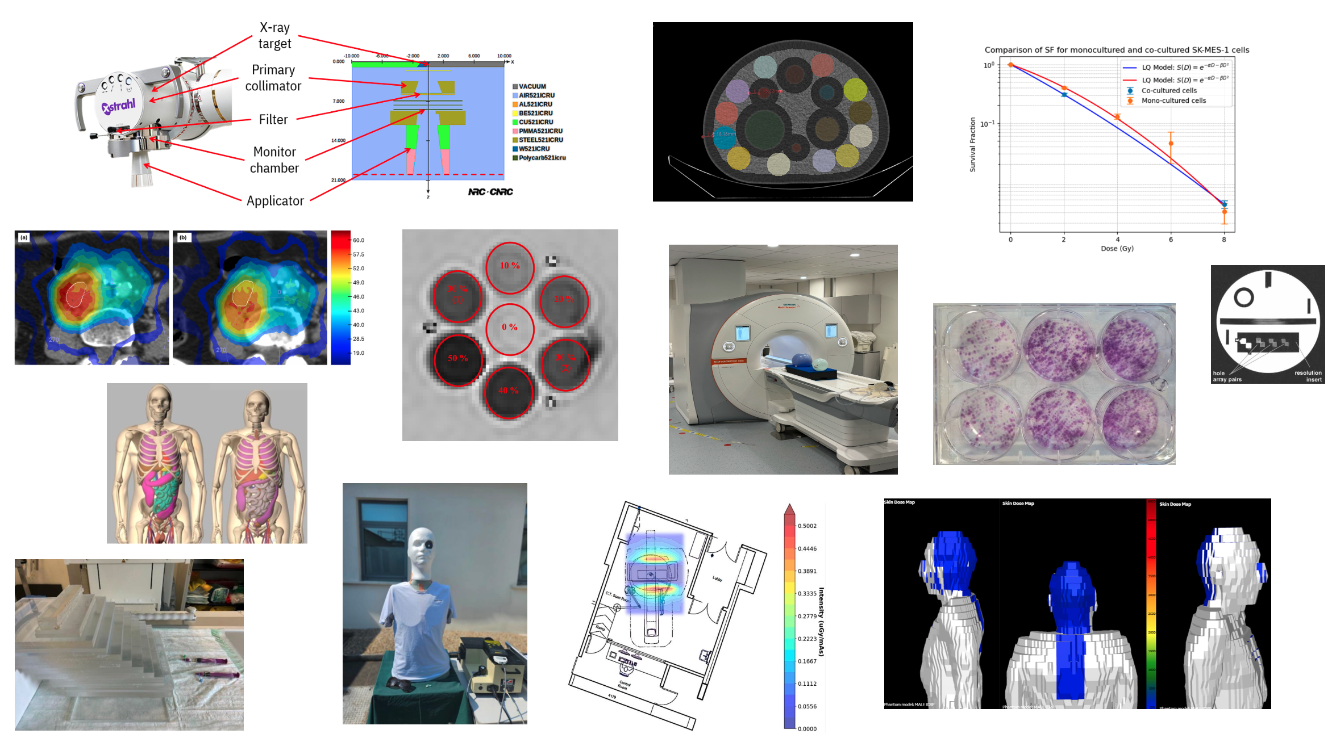MSc. Research Projects
As part of the MSc. in Medical Physics, our students complete a 30 ECTS credit capstone research project in an academic or clinical workplace relevant to the medical physics sector. The project, which is undertaken mainly during the summer trimester (12 weeks), may be offered in areas such as diagnostic imaging, nuclear medicine, radiation protection, radiation oncology physics, detectors and dosimetry, and radiobiology. The project provides an ideal opportunity to apply the knowledge and core skills acquired in the taught modules, whilst developing additional research and professional skills relevant to medical physics, including skills in planning, literature review, data collection and analysis, formulation of well-defined hypotheses and development of clear conclusions. Students are supported by academic/clinical supervisor(s), who provide guidance throughout the research project. The research project is concluded with a written thesis and an oral presentation. A list of past projects is given below.
2024/25
-
Investigation of the impact of Partial Volume Effects (PVE) on dose assessment and planning in Selective Internal Radiation Therapy (SIRT)
-
Development of guidance criteria for optimal eye protection to patients undergoing oral PUVA phototherapy
-
Evaluation of the impact of rotations on nodal boosts in Gynae SIB patients
-
Multi-system and centre benchmarking of CT imaging performance for routine thorax scans
-
Assessing the undertainty in clinical protocols using deep resolve AI diffusion imaging with quantitative MRI phantoms
-
An image quality comparison of contrast agents used in fluoroscopic fertility investigations (Hysterosalpingography)
-
Development and validation of a B1+rms and an image quality model for Deep Brain Stimulator MRI imaging
-
Development and validatio of kilovoltage Monte Carlo using Python
-
A radiobiological study of the interaction of immunotherapy agents with radiation therapy
-
Development of a scatter correction technique for planar CZT nuclear medicine imaging to improve accuracy in lung shunt fraction estimation
-
Evaluation of clinical CT radiation protection methodology
-
Investigating peak skin dose accuracy in fluoroscopy-guided interventional procedures
-
Assessment of MRI geometric distortion in neuronavigation
2023/24
-
Secondary malignancy risks in photon and proton therapy
-
Investigation and characterisation of off-focus radiation peaks from a digital breast tomosynthesis system
-
CT protocol optimisation for depth electrode visualisation in epilepsy surgery..
-
Optimisation of US and SPECT/CT thyroid volume measurement for personalised iodine therapy treatment planning.
-
Assessing the image quality and dose of CT thorax examinations across a range of clinical indications.
-
Design and manufacturing of anthropomorphic phantoms mimicking lung disease: application for CT image quality assessment.
-
Clinical impact of specialised reconstruction kernels for cardiac CT calcium score.
-
Investigation of the effect of protocol choice on the visibility of various materials in neurointerventional radiology.
-
Quantitative image analysis of MRI scans to assess the efficacy of a deep learning based image reconstruction method.
-
Assessment of radiomic feature stability for F-18 PET/CT imaging.
-
An investigation into the limiting noise quantity and quality of digital radiograph images for use in AI classification models.
-
Quantitative susceptibility mapping: bridging the gap between research and the clinic by investigating next-generation quantitative MRI.
-
Analysing the impact of airway variation in radiotherapy using velocity's deformation workflow.
- Radiobiome - A proof of concept study on host-gut microbiome functional resilience to radiation.
-
Use of AI segmentation to assess dose to rectum in prostate radiotherapy patients.
-
Assessment of variation in OAR volumes using AI auto-contouring during head/neck radiotherapy.
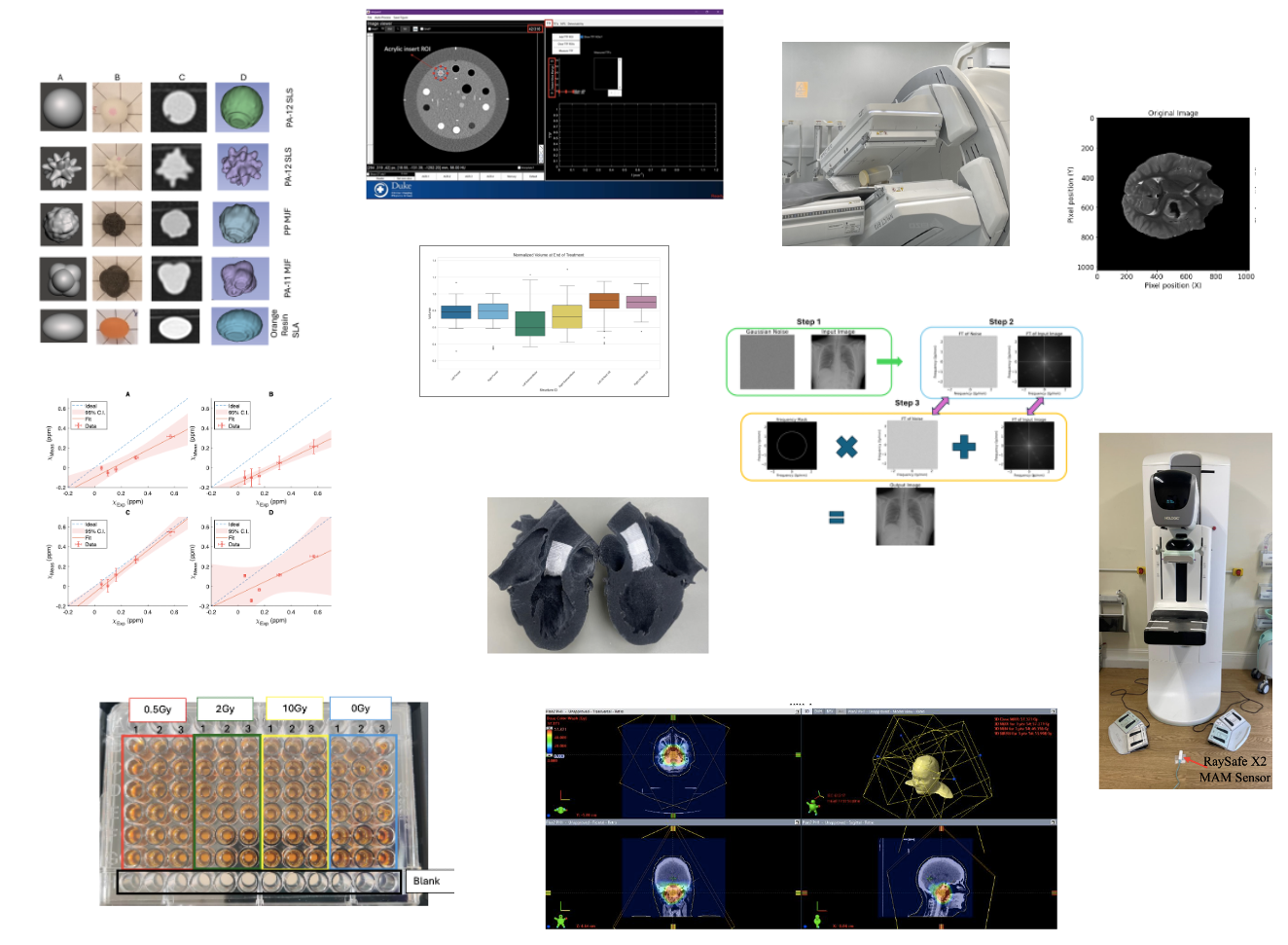
2022/23
-
A biological effective dose (BED) calculator for re-treatment evaluation in SABR lung.
-
A national comparison of mobile X-ray practices in neonatal intensive care units / special care baby units.
-
PET/CT optimisation: process and methods.
-
Methodological factors which influence dynamics NIRS measurements in human - characteristics and correction strategies.
-
Validation of non-invasive system for triage of large vessel acute ischemic stroke.
-
A review of respiratory imaging in nuclear medicine and the role of quantifications.
-
A comparison of the image quality obtained on multi-slice CT (MSCT) with that achieved on three CBCT systems (Cone Beam Computed Tomography) using the QUART IAEA-EFOMP-ESTRO test set.
-
Validation of metrics to assess the clinical image quality of abdominal CT scans.
-
Independent verification of extremity cone beam CT image quality performance.
-
Comparing photon and proton therapy for head & neck patients.
-
Evaluation of the accuracy of a combination of face masks (open/closed), surface guided (thermal/non-thermal) and X-ray positioning systems on cranial stereo patients.
-
Accelerated MRI: how fast can we go with compressed sensing and simultaneous multi-slice?
-
Chart of key performance indicators (KPI) for mammography systems optimisation.
-
Design and manufacturing of anthropomorphic thorax phantoms for image quality assessment.
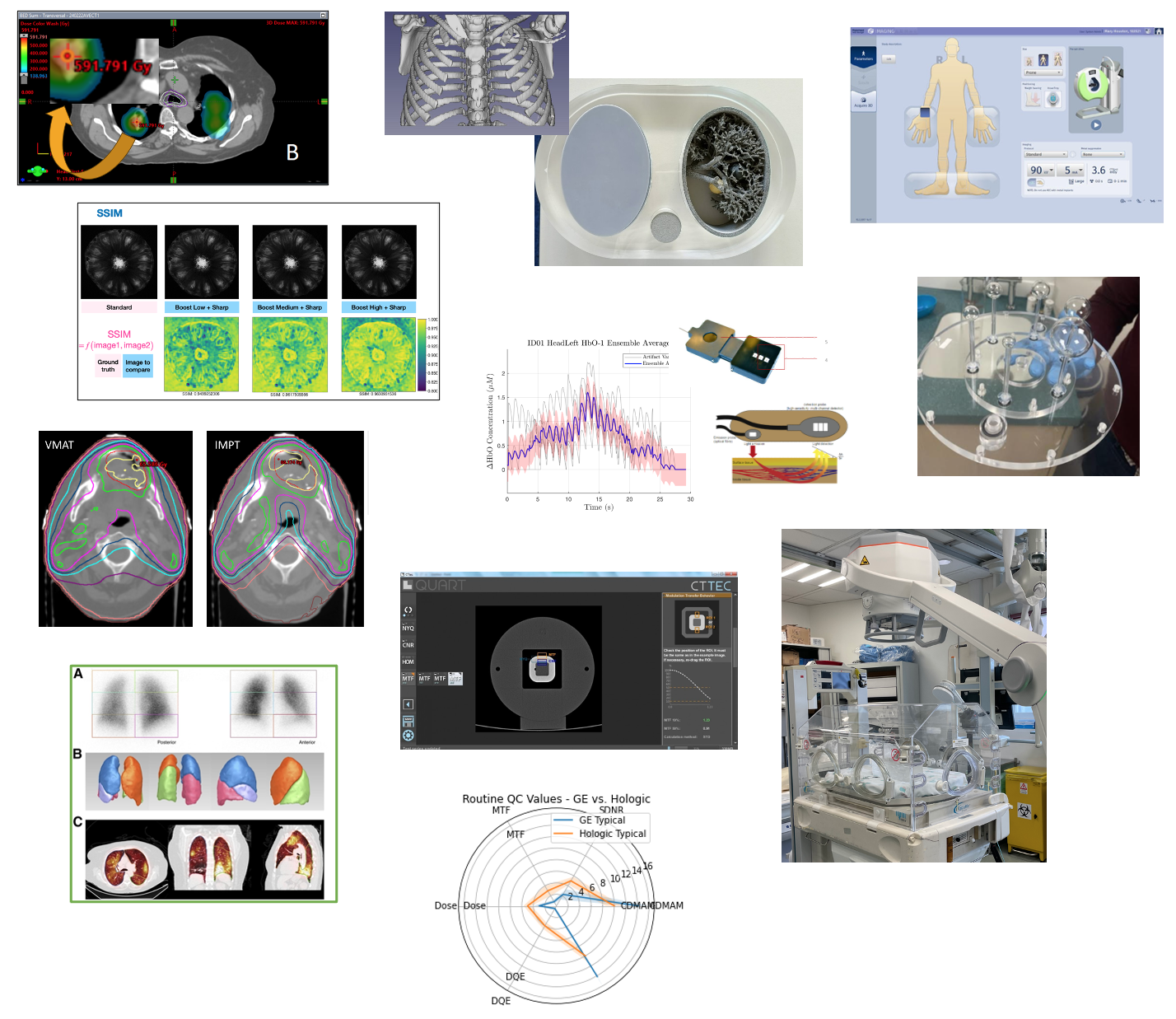
2021/22
-
An automated image analysis-based approach for MRI quality assurance.
-
Theoretical and experimental assessment of the benefits and limitations of moving from 1.5 T to 3 T MRI.
-
Optimisation of the GE Pristina mammography system.
-
Measuring the kinetics of a contrast agent in a naive rat brain measured by dynamic-constrast enhanced magnetic resonance imaging.
-
EGSnrc Monte Carlo simulation of LiF ring dosimeter TLDs for a range of nuclear medicine and PET radionuclides.
-
The effect of iodine concentration on low contrast resolution in cone beam computed tomography (CBCT) for abdominal GI bleed studies in interventional radiology.
-
Investigation of the opportunities and limitations of TOPASnBio Monte Carlo extension for simulations on radiobiological damage.
-
Determining the factors that influence the repeatability of system projection MTF (Modulation Transfer Function) measurements in breast tomography systems.
-
A comparison of planned and measured dose distributions around clinical brachytherapy applicators.
-
Examining the quantification accuracy of 18F-fluorodeoxyflucose (FGD) uptake of atherosclerotic plaques in PET/CT imaging using phantom and simulation studies.
-
Surface deformation in radiotherapy.
-
Optimisation of CT in SPECT/CT in nuclear medicine.
-
Development of a computer vision technique for objective and quantitative comparison of diagnostic ultrasound muscle architecture images.
-
A study into the repeatability of practical measurements of the modulation transfer function (MTF) including a comparison of various software packages.
-
Quantifying the effects of respiratory motion using SIMIND Monte Carlo software for imaging optimisation in nuclear medicine.
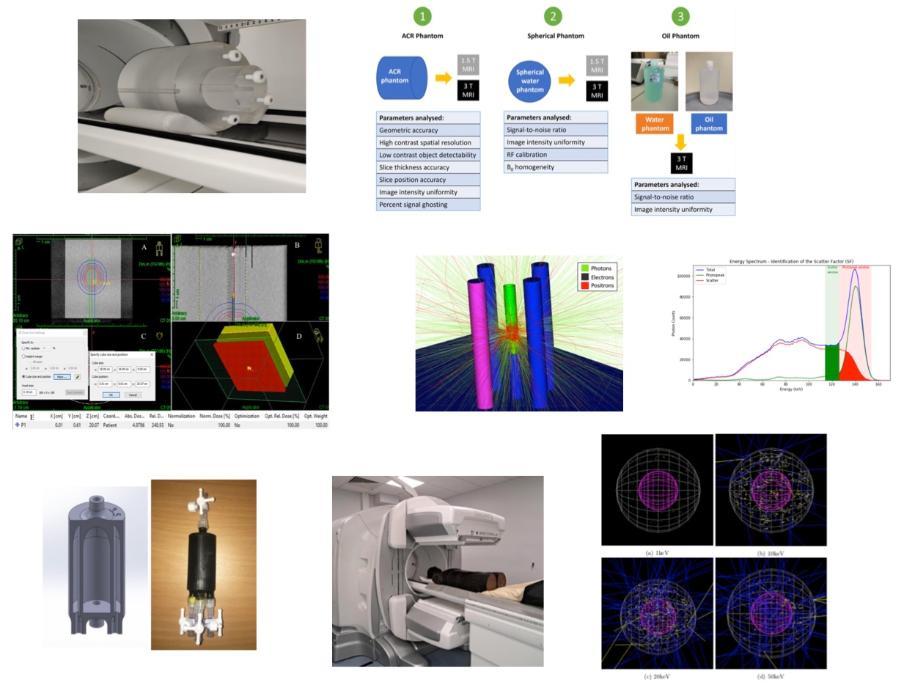
2020/21
-
Optimisation of reconstruction techniques for the accurate quantification of 18F-fluorodeoxyflucose (FDG) uptake in atherosclerosis using PET/CT imaging.
-
A task-based dosimetric assessment of interventional cardiologists behaviour using a real-time active dosimetry system.
-
Feasability of using 3D-printed mouth bites for head and neck radiotherapy treatments.
-
Use of an MRI scan-based 3D printed personalised phantom to evaluate eye lens dose.
-
Monte Carlo modelling of a kV treatment unit using TOPAS.
